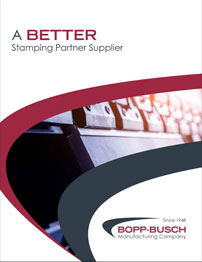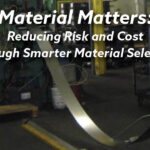As environmental sustainability becomes a core objective for businesses and industries worldwide, metal stamping has in turn met this challenge head-on to provide precise and high-quality products that minimize environmental impact. Advancements in technology and improved system processes lead the charge as precision metal stamping evolves to meet the ever-changing needs of the industries it serves.
Traditionally, metal stamping processes utilize a large quantity of natural resources, involve significant energy consumption, and can create consequential material waste. Chemicals and lubricants often used in these processes can also create pollution or environmental hazards, particularly when not properly handled or disposed of. As businesses seek to find new and innovative ways to increase sustainability and lessen environmental impact, new processes and procedures have been introduced to the metal stamping landscape to meet customer and client needs while lessening environmental harm.
Material Optimization
One key way metal stamping has progressed leaps and bounds in regards to sustainability is the development of advanced precision engineering capabilities that decrease the amount of material waste or resulting scrap metal. Advanced software and tools can now optimize materials to lessen resulting waste while cutting costs at the same time.
Recycling & Reuse
Material optimization is also strengthened by the use of recycling and reusing materials, thus reducing the need for high quantities of raw materials that deplete natural resources. Scrap metal created from metal stamping processes can now be recycled and reintroduced into production cycles, therefore minimizing landfill contributions.
Eco-Friendly Chemicals
While lubricants, coolants, and other chemical solutions are necessary for metal stamping processes to occur, new products are entering the market that prove to be more environmentally-friendly. Now, biobased products and non-toxic alternatives are available that maintain efficiency and quality, reduce environmental impact, and also prove to be less corrosive on equipment and safer for employee handling.
Automated Quality Control
One of the other major advancements in the metal stamping field is the increased use of automation and high-precision quality control. These systems are able to detect malfunctions or errors in metal stamping processes using real-time sensors, and can then allow manufacturers to correct issues or reset systems early in the production process. As a result, materials are less likely to be wasted and quality of products increases significantly.
The demand for eco-friendly and sustainable practices across all industries continues to grow, and the metal stamping field has progressed to meet this pressing need. With technological advancements and the use of biobased products, metal stamped components continue to maintain their quality and precision while lessening their environmental impact and harm.



